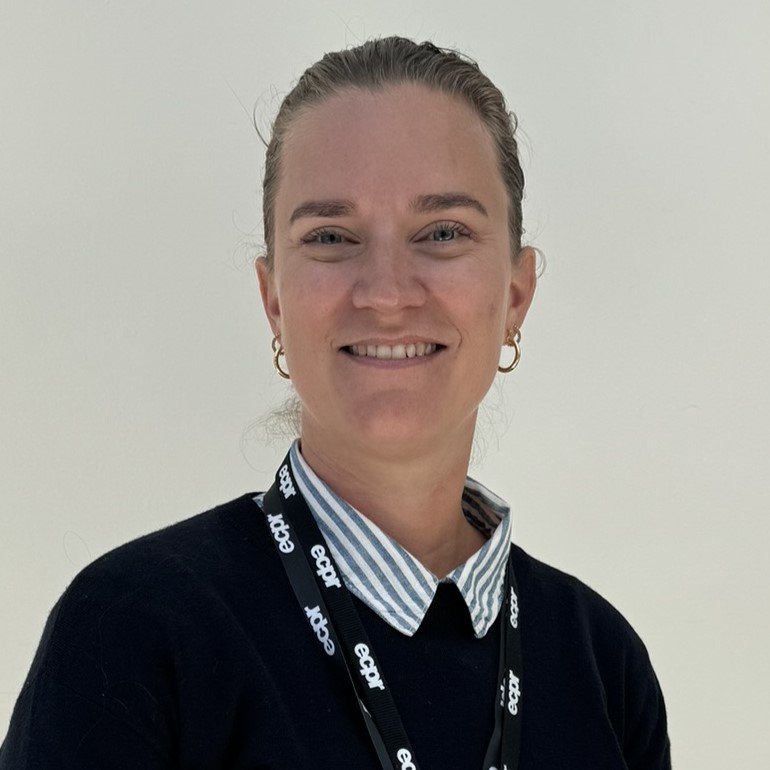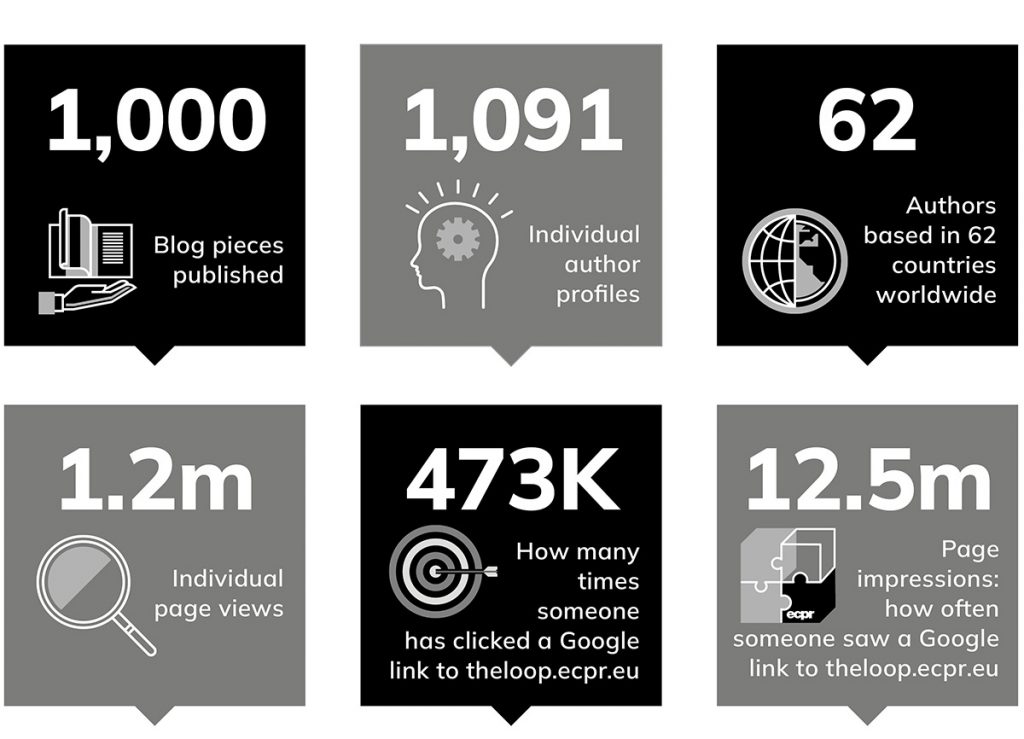Four years ago, ECPR launched this path-breaking website. A thousand blogs later, Managing Editor Kate Hawkins looks back on our achievements, and considers how far we've come
ECPR had long discussed the need for an open-source blog site – a showcase for accessible, short-form content that would appeal to policymakers and practitioners. From a competitive call for Academic Editors to drive this exciting project, we appointed Johanne Døhlie Saltnes (ARENA, Oslo), and former ECPR Director Martin Bull (Salford).
Over the summer, we worked with a marketing agency to build the platform and scope out workflow. The agency coined a title, and created the broken-diamond logotype. Our team drew up Author Guidelines to ensure consistency of style.
Martin and Johanne reached out to contacts across the academy, assembling a twelve-strong launch collection. The Loop went live on 12 October, alongside a Twitter account to boost engagement. At this time, Covid continued to rage, and many early posts focused on pandemic (mis)management by governments around the world.
The speed of growth took us by surprise! Through 2021, we published an article every working day, and initiated a bi-weekly Loop digest email for ECPR's Publications list.
In July, a provocative post from Jean-Paul Gagnon issued a rallying cry to build a 'data mountain of democracy', and invited responses from fellow democratic theorists. Our first series – the 🦋 Science of Democracy – was born. By year-end, we had attracted 32 contributions reacting to Jean-Paul's foundational thesis. In August, Luca Manucci published the opening instalment in his 🌊 Illiberal Wave series. Subsequent contributions examined the rise of authoritarianism in a variety of global contexts, setting in train another important conversation.
With our reputation firmly established, the proportion of pitched content soared from 38% to 75%. We achieved ambitious production targets while reducing the commissioning burden on the Editors. Many 2022 contributions considered the implications of war in Ukraine and re-emergence of the far right around Europe. To our series portfolio, we added Hager Ali’s♟Autocracies with Adjectives and Eduardo Burkle’s 📐 Measuring Human Rights.
At the Innsbruck General Conference I delivered a First-Time Blogger presentation for early-career scholars, helping demystify the blog-writing process. We followed up with an interview in which two regular contributors discussed with Martin their experiences of writing for The Loop.

'Editing the Loop is immensely rewarding. It's a front-row seat for emerging ideas, a platform to amplify diverse voices, and a chance to distil complex research into insights that inspire and inform'
Johanne Døhlie Saltnes
'Blogging is not just good for your research and your career – it's a great way to connect with the academic community, and it's terrific fun. Why not join us and find out?'
Martin Bull

Last year, the proportion of pitched content jumped again, from 75% to 94%. However, because men are more likely than women to submit, our gender balance – with which we had struggled since day one – remained unequal. To address this, Johanne and Martin committed The Loop to the 50:50 gender parity challenge. By December, we had pushed up the proportion of published female authors by 7%. We were also delighted to learn that per-month clicks and page impressions had more than doubled on the previous year.
2023 was a huge one for Loop series, with the launch of 💊 Rescuing Democracy, 🌈 Gendering Democracy, 🔮 Future of Populism, ⛓ Constraints on Academic Freedom, and 🎭 Democratic Transformations. Across this year, just over half our published output was attached to a series thread.
Innovations included 45-minute 'Bootcamp' workshops at the General Conference in Prague, at which participants brought along raw copy, and edited it, in real time, with the help of WordPress readability software. We initiated an annual Best Blog Prize, presenting the first award to Reginald Oduor for his powerful contribution to our 🦋 series.
All authors receive a post-publication survey, allowing us to gain constructive insight into their experience. For the second year, we were encouraged to discover that 100% of authors would work with The Loop again. High praise! Interestingly, feedback also shows that contributors find The Loop via numerous routes, from emails to social media, to word-of-mouth recommendations.
By December, Twitter-X growth had slowed dramatically in the wake of Elon Musk’s takeover. At the time of writing, The Loop remains on the platform, but our BlueSky account is gaining followers apace.

By early 2024, the volume of content was becoming unsustainable for our tiny team. Responding to feedback from ECPR's Publications Subcommittee, we adopted a policy of stricter acceptance criteria, and a cap on published pieces. Despite these new constraints, we have covered all the year's major events, including conflict in the Middle East, continuing war in Ukraine, the big election year, and how AI, social media, and conspiracy theories are shaping democracy.
We celebrated International Women's Day with eight gender-focused pieces, and completed an important partnership with young female scholars in Eastern Europe, examining gender rights under illiberal regimes.
At the Dublin General Conference we reprised our Bootcamp workshops with even greater success, and laid down a five-year plan for development. Recently, we established a partnership with EUObserver magazine, which will republish a selection of Loop pieces relevant to their readers. Finally, we teamed up with European University Institute to coach journalism students in blog-writing skills.
Our heartfelt thanks to all who have made The Loop the thriving resource it is today. If you've read this far, and you have never worked with us: can we tempt you into the blogosphere?
Publishing with The Loop drives traffic to your research, boosting citations – and book sales. Blogging can raise your scholarly profile, and helps create engaging social media content. You might choose to offer professional insight on a fast-developing area of political interest (The Loop can turn your piece around in 48 hours flat 😉). You could even publish a deliberately contentious piece inviting below-the-line comments.... Be brave! Our door is always open.